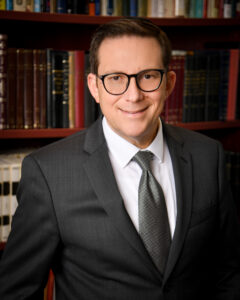
Rabbi Eric Grossman
“When I was in school, do you know what I used to love about exams?” I sometimes ask my students. I then immediately supply the answer:
“Nothing.”
Empathy is essential in education, and I feel particularly empathetic towards my students when I see them writing a test. Young or old, no one likes to be tested. As pupils, it is a painful experience to be put in a pressurized setting and asked to produce proof of mastery. And afterwards, when we graduate and enter the work force, we continue to balk at being tested in our jobs. A 2018 article in Harvard Business Review about professional reviews put it bluntly: “People hate performance evaluations. They really do.” Outside of work and school, in our personal relationships, we also have a negative reaction to being assessed; we know that it is not a good sign between intimates when one asks, “Are you testing me?”
Test-anxiety and trepidation confront us as we enter the High Holidays, for this is the exam period for the Jewish people. The Days of Awe are both an end-of-year evaluation of our past performance, and an entrance examination to see if we qualify to matriculate to the next term. Rosh Hashanah and Yom Kippur also physically resemble sitting an exam: We are herded into a room with our peers, assigned a seat, and expected to give an accounting of what we have done all year. We are required to read and respond to a text that is in front of us, and we are asked to follow the instructions given by the person proctoring at the front of the room. We are expected to be quiet and serious, and we are encouraged to stay to the end.
Why does God subject us annually to this ordeal?
Because it is impossible to improve without periodically monitoring our progress. This is true in education, in our jobs, and in our personal moral and religious lives. People make progress only by stopping often to question how they are doing and asking if they have gotten better. But while testing is necessary for improvement, not all tests are the same.
We all know what bad testing is like. Bad tests are poorly constructed with unclear instructions and elusive purpose. Bad tests are given in bad faith such that we feel the instructor is out to get us, that the test is beset with traps, that the examiner derives a perverted pleasure from seeing us fail. And we feel that, no matter how much we prepare, we not going to pass.
Good tests, on the other hand, are when we know that we are being tested only so that we can demonstrate our aptitude and understand how to improve. We know that the tester and the tested are on the same side, and both will be proud of a successful outcome. We enter feeling prepared and confident.
On the first day of Rosh Hashanah our Torah reading begins:
“It happened after these things that God tested Abraham, and God said, ‘Abraham,’ and he said, ‘hineini—here I am.’”
With these words, the Torah presents us with the model of good testing, the Binding of Isaac. Both God and Abraham are eager to engage in the test, and Abraham’s response, hineini, has the meaning of, “I am ready, I am prepared.”

Rembrandt’s The Sacrifice of Abraham
Abraham is ready because, our rabbis tell us, God does not spring this test on him. Abraham has already taken a series of quizzes before his tenth and final test, the Akeidah. God is convinced that Abraham will pass, which is why neither God nor Abraham—nor we, who read it in shul—are worried. We know it will end well.
The rabbis designated the Akeidah as the first Torah reading of the High Holidays to assure us that we can enter our own tests during the Ten Days of Repentance with the same confidence of Abraham at the Akediah. Naturally, we still experience anxiety, for we know how much is at stake. But, like Abraham, we believe that, while God is putting us on trial, he wishes only for our victory.
There was a professor I knew who was beloved by his students and had won numerous teaching awards during his life-long career teaching philosophy at a renowned university. He was asked once what he thought made him a good teacher. He responded that at the beginning of every semester he began his class with the following words to his students: “It is my goal that everyone here gets an A+. And I will do everything in my power to get to this goal.” He was then asked if he ever taught a class where everyone got that grade. “Never,” he said, “but that was always my goal.”
We enter Rosh Hashanah knowing that God has done everything in His power to help us get an A+ by the end of Yom Kippur. As Rabbi Hananiah ben Akashia teaches (Mishnah Makkot 3:16), God has given us Torah and Mitzvot so that we, the People of Israel, can succeed. Torah and Mitzvot are our study guide, and we must do our part by working diligently and coming prepared. If both teacher and student do their part, when the bell rings signaling the end of the test, it will invite words of mutual pride and congratulation.
At the end of the Akeidah, God shows Abraham a ram and announces that he had passed that greatest of all tests: “Atta yadati ki yarei Elohim atta—Now I know that you revere God!” The sound of the shofar at the end of Yom Kippur evokes the buzzer at the end of test, the ram of the Akeidah, and God’s words assuring us that we, like Abraham, have passed.
Wishing all our Akiva families a Shanah tovah u-metukah from myself, Karynne, Ezra and Max.
Rabbi Grossman





